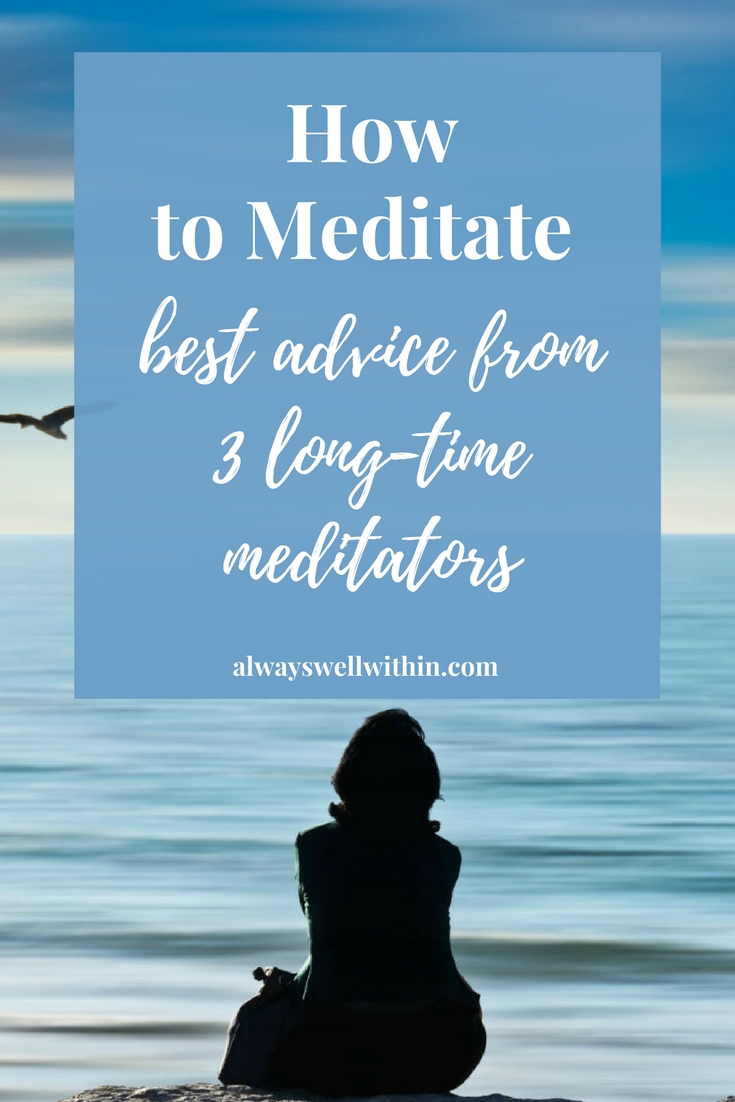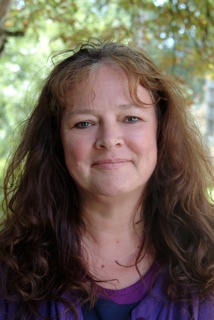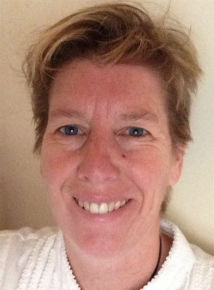 Mindfulness has become such a popular topic that bloggers are writing about it non-stop. Some develop online courses on the topic as well. But, do they know what mindfulness or meditation really is?
Mindfulness has become such a popular topic that bloggers are writing about it non-stop. Some develop online courses on the topic as well. But, do they know what mindfulness or meditation really is?
I have a concern that the practice of meditation could be be diluted by well-intentioned, but inexperienced individuals. So I invited three authentic and accomplished meditators to share the joys and challenges of meditation with you.
I'm delighted to introduce you to Elizabeth Mattis Namgyel, Maureen Cooper, and Maia Duerr. Collectively, these dedicated women represent nearly 100 years of meditation experience including several three-year retreats. Yet, their responses are as fresh and relevant as any beginner's mind.
Without further ado, let's delve into the purpose of meditation, helpful ways to structure your practice, and how to work with some of the common obstacles that arise in meditation.
Elizabeth Mattis Namgyel on Meditation
Why do you meditate? How does it help you?
I meditate because I have a longing to habituate my mind toward sanity. I often think of the traditional analogy of the untrained mind: it’s like a blind, limbless person riding a wild horse – you can’t rein it in. There’s no freedom in that.
We have so many preferences in term of what we want to experience. When I sit to practice sometimes I feel peaceful and sometimes my thoughts, emotions or sensations feel jagged and wild, sometimes painful and overexcited.
Due to the practice I don’t judge that or particularly see that as a problem. It is the expression of the natural vitality or rich energy of the mind. Without practice, I would do what we all seem to do: brace against the activity of the mind or get lost in the momentum of thoughts. There’s no grace in that – no sanity.
Through meditation I have become less intimidated by my mind – less naïve. I see that my thoughts and emotions are insubstantial and that makes me less reactive, more curious and appreciative toward this momentary experience I call my life.
What’s your daily practice look like?
I do formal practice every day. I get out of bed, make offerings to my shrine and then get to it. I get up early so nothing gets in my way. Then as I move about my day I continually remember my practice and think about the teachings and my teachers. I look for opportunities to practice Loving Kindness all day long. Contemplation is also important to me. I love the Middle Way [Buddhist] teachings – the logic of them.
What’s been your main challenge in meditation and how have you overcome it?
The main challenge comes when I forget to value everything that arises in my mind and life as a teaching. Sometimes I find myself subtly rejecting experiences, as if I were wishing I were someone else, somewhere else, having a different experience. When I remember not to judge my experience, I enjoy it so much. From the practice point of view, everything is useful. In this way everything becomes positive.
Elizabeth Mattis Namgyel has been practicing the Buddhist teachings for almost 30 years under the guidance of her teacher, Dzigar Kongtrul Rinpoche. She is the author of The Power of an Open Question.
Maureen Cooper on Meditation
Why do you meditate? How does it help you?
Even as a child I longed to understand how the world worked and to know something about why things were as they were. Over the years this longing brought me in contact with all kinds of interesting people and ideas but it was not until I started meditating that anything really made any lasting sense.
Meditation helped me to learn that how my mind is will determine how I see the world and the actions that I choose to engage in. It’s been over thirty years since I began to meditate and my main experience is of being made a gift of myself—of beginning to know how to handle myself through all my moods and challenges.
What’s your daily practice look like?
On waking up in the morning I like to take a moment to just connect with my breath before getting out of bed and starting the day. After showering and making tea is the time for sitting on the cushion and I am rigorous in not getting into too much other activity before my session. Before I begin I take a moment to think of people close to me, or having a hard time and to wish them well and after the session to include them in any benefit I experience—this can be extended to include any trouble spots featuring in the news.
During the day as I am working I like to take moments to return to my breath and to just pause in my activity. These are opportunities to connect with myself and to check how my mind is. This can be especially helpful when I am under pressure or have a lot on and it is all too easy to get carried away by worry and emotion.
What’s been your main challenge in meditation and how have you overcome it?
My experience of working to establish a stable meditation practice is that it does get easier the longer you keep trying. Current neurological research bears this out—the brain can change in response to our experience and so a habit become easier to maintain the more you practice it.
Once I got over the idea that meditation had to be done perfectly every time, and was something outside of myself that I had to ‘do’ things became much easier. Realizing that meditation is an on-going experience in working with your mind in any situation and any mood and that sometimes this would be fun and sometimes hard and sometimes just plain boring freed me from any notions of having to be a perfect meditator.
Maureen Cooper is the author of the recently published book, The Compassionate Mind Approach to Reducing Stress and the founder-director of Awareness in Action, a consultancy dedicated to introducing meditation and compassion into the workplace. To check out her blog visit Awareness In Action.
Maia Duerr on Meditation
Why do you meditate? How does it help you?
Meditation helps me stay awake to my life. While that sounds like such a simple thing, it is oh-so-hard to do!
What is “waking up” and why is it so important to me? Think of what happens when you drive a familiar route, perhaps the way you get to work each day. Have you ever noticed that you suddenly look up and discover that you've arrived at your destination and you have no recollection of what happened in the 30 minutes before you got there? You were on auto-pilot. Life can get like that too.
I've learned that the times I've been on autopilot are usually when I've made the worst 'mistakes.' I hesitate to call them "mistakes" because that implies I was aware of what I was doing. It's more like I was not tuned into some pretty important dynamics -- like a partner who was very unhappy with some of the choices I was making. And because of that, things fell apart -- like that relationship.
So I meditate to stay more awake to what I am doing and how it impacts myself and other people. And the earth as well. I believe it becomes more possible to make choices that sustain our lives when we are in this place of “being awake.”
What’s your daily practice look like?
I try to anchor myself every day in the practice of zazen (sitting meditation). That’s fundamental for me! Sometimes I miss a day, but when I’m consistent in my practice it creates a kind of alchemy that cultivates awareness and creativity.
I also take mindful walks whenever I can in the beautiful area surrounding my home in Santa Fe, New Mexico. We’re up at 7000 feet, in the foothills of the Sangre de Cristos mountains. As I walk, I take in the changing light on the mountains and the incredibly expansive blue sky, as well as the creatures who live here (rabbits, coyotes, lizards, birds of all kinds). This helps to nourish me.
What’s been your main challenge in meditation and how have you overcome it?
The biggest challenge I've had in my meditation practice is keeping it going when I am not in crisis. Over the years it has become clear to me that meditation can literally save my life. When I’ve experienced loss of various kinds and felt deep grief, it is the medicine I go to for healing. But when life stabilizes again, I’m tempted to let it go. By focusing on the nourishment aspect of meditation and realizing that it helps me not only when I am in crisis but that it enhances my life when things are going well, I’ve been able to keep a more consistent practice.
Maia Duerr is a writer, anthropologist, ordained Buddhist chaplain, and longtime student of meditation. She loves to support people in their search for true freedom through her Liberated Life Project as well as her business, Five Directions Consulting.
The True Power of Meditation
There are hundreds of research articles on the benefits of meditation every year now. Mindfulness, for example, has been shown to decrease stress, lower blood pressure, and boost the immune system, and that's just for a start.
There's nothing wrong with practicing meditation to gain positive results like those mentioned above. At the same time, meditation is far more than a practical, self-help technique. In fact, although mindfulness is essential, it's simply the first step in meditation.
Most importantly, as we can see from these insightful responses, meditation is a way to train your mind to diminish negativity and enhance its natural goodness. In so doing, you begin to taste genuine happiness and true freedom. And from that space of clarity, compassion naturally arises. Meditation then is the ultimate way to end suffering for ourselves, for others, for our world.
My heart-felt gratitude to Elizabeth, Maureen, and Maia for sharing their knowledge, experience, and insights into meditation with us today.
Thank you for your presence, I know your time is precious! Don’t forget to sign up for my e-letter and get access to all the free self-development resources (e-books, mini-guides + worksheets) in the Always Well Within Library. May you be happy, well, and safe – always. With love, Sandra



